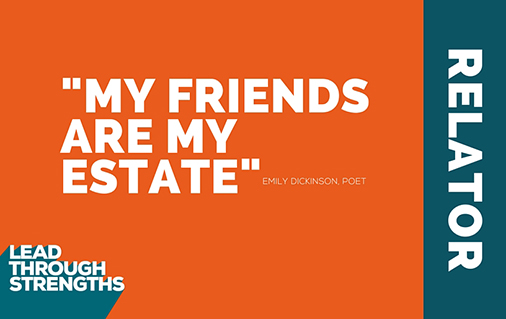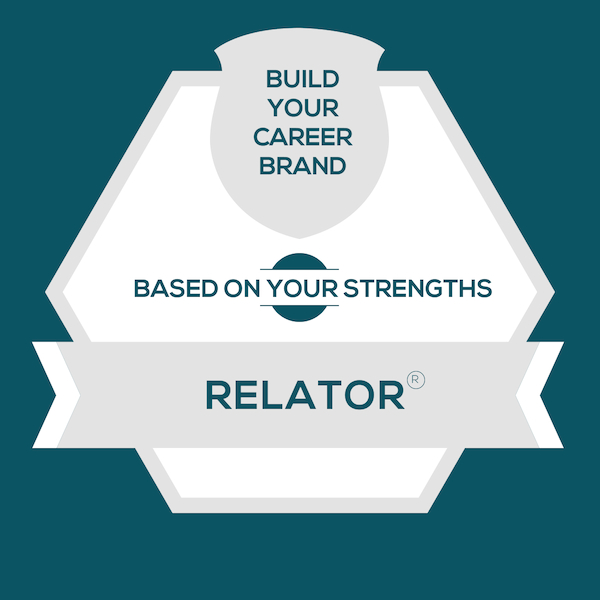People who are strong in the Relator theme enjoy close relationships with others. They find deep satisfaction in working hard with friends to achieve a goal.
You can tell a person strong in Relator by these attributes (source: Dr. Hulme, APU):
- Enjoy working hard with close friends to achieve a goal together
- Deep relationships with a small circle
- Pulled toward people they already know
- Comfortable with intimacy
- Self-disclosing
More about Relator:
-
- Needs on a team: To have closeness with others
- As a Leader: Enjoy reaching goals with others
- In Conflict: Are anxious about distance from others
- Partner with: NONE LISTED
- In academics:
– loves to work with close friends – who teaches the class is more important than what is taught – relationships with profs matter – enjoys taking classes with friends – sense of community in the classroom is important to them
Where does Relator Theme rank in the population?
- Overall, Relator ranks 4th, occurring in around 27% of the population’s Top Five (27% of Females and 25% of Males)
3 |
5 |
3 |
|
Out of your Top 5 CliftonStrengths, it’s statistically:
- most likely to appear with Responsibility and Achiever
- least likely to be found with Command or Woo
The genius of your Relator talent is found in the fact that you can form relationships with virtually anyone.While you prefer relationships that are real and genuine, you have the capacity to form relationships with almost anyone.You can form relationships with people older, younger, or the same age as yourself. You can form relationships with people who have more, less,or the same status as yourself. You can also form relationships at different levels of closeness or intimacy. For example, you have at least four levels of relationships. At the fourth level, you have lots of acquaintances. On the third level area group of relationships that are closer. On the second level, you have a group of friends. But you also have an even closer group of people, people in your“tight group”. While there are usually six or less in your tight group and many or few in the other three groups, the genius of your Relator strength is your ability to form relationships on these multiple levels of intimacy.
At your best (Balcony):
-
caring, trusting, a great friend, forgiving, generous
At your worst (Basement):
-
lives in a clique, crony, has an inner circle, plays favorites
 Relator may be one of your signature themes if…
Relator may be one of your signature themes if…
- You derive great pleasure and strength from being around your closest friends.
• You feel most comfortable forming intimate relationships with a few confidants.
• You enjoy opening up and forming deep relationships with people you deem worthy.
• You want to understand the feelings, fears, goals, and dreams of others on a deeper level.
• You are more than willing to risk vulnerability in exchange for a genuine relationship.- Source: Let’s Talk Personality
A more detailed explanation from Gallup:
Relator describes your attitude toward your relationships. In simple terms, the Relator theme pulls you toward people you already know. You do not necessarily shy away from meeting new people — in fact, you may have other themes that cause you to enjoy the thrill of turning strangers into friends — but you do derive a great deal of pleasure and strength from being around your close friends. You are comfortable with intimacy. Once the initial connection has been made, you deliberately encourage a deepening of the relationship. You want to understand their feelings, their goals, their fears, and their dreams; and you want them to understand yours. You know that this kind of closeness implies a certain amount of risk — you might be taken advantage of — but you are willing to accept that risk. For you a relationship has value only if it is genuine. And the only way to know that is to entrust yourself to the other person. The more you share with each other, the more you risk together. The more you risk together, the more each of you proves your caring is genuine. These are your steps toward real friendship, and you take them willingly.
Action Items for This Theme
- Find a workplace in which friendships are encouraged. You will not do well in an overly formal organization. In a job interview, ask about work styles and company culture.
- Deliberately learn as much as you can about the people that you meet. You like knowing about people, and other people like being known. In this way, you will be a catalyst for trusting relationships.
- Show people that you trust them and they will be more likely to trust others. You can be an important role model in this area.
- Let it be known that you are more interested in the character and personality of others than in their status or job title. This is one of your strengths and can serve as model for others.
- Let your caring show. For example, find people in your company to mentor, or help your colleagues to know each other better, or extend your relationships “beyond the office.”
- No matter how busy you are, stay in contact with your friends. They are your fuel.
Be ready to:
- Be honest with your friends. True caring means helping the other person be successful and fulfilled. Thus, giving honest feedback or encouraging your friend to move out of a role in which he or she is struggling is a caring act.
- Forgive a close friend. When someone lets you down, you take it seriously, and might become skittish about renewing the relationship. Honor this reluctance, but don’t let it stop you from extending trust again.
- The Clifton StrengthsFinder and the 34 Clifton StrengthsFinder theme names are protected by copyright of Gallup Inc., 2000. All rights reserved.
For the more visually inclined:
A fantastic website with insightful discussion of Relator, including
 Building your brand through this strengths
Building your brand through this strengths- Strengthening your performance at work
- Tips for managing someone with this strengths
- Partnering with someone with this strength

 Relator Power and Edge takes an interesting approach highlight not just what the strength is and how it shows up if you have it in your top five, but also how to navigate the world when this strengths is one of your lesser ones.
Relator Power and Edge takes an interesting approach highlight not just what the strength is and how it shows up if you have it in your top five, but also how to navigate the world when this strengths is one of your lesser ones.
More ideas on going deeper:
- Gallup on How You Can Productively Aim Your Relator Talents
- Many universities use the StrengthsQuest Workbook to help you build relationships, more effectively study and find meaning in what you do.
- South Mountain Community College offers up ideas on Applying your Talents in Career Discovery and Applying your Talents in Academics
- Western Texas tells us about Using your Strengths In the Job Search, Interview and New Position
- Weber State University has posted action plan worksheets for each of Gallup’s 34 strengthsfinder talents.
 From Lead Through Strengths listen/read:
From Lead Through Strengths listen/read:
Career Branding When Relator Is Your Strength includes an audio file exploring:
1. Career Branding
2. Red Flag Situations At Work
3. Fresh Application Ideas
THEME INSIGHTS:
- I am (Being) ———-> Genuine and authentic
- I will (Doing) ———-> Get to know more about the people closest to me
- I Bring (Contribution) ———-> Social depth and transparency
- I need (Requirement) ———-> Time and opportunities for one-on-one opportunities
- I love (Value) —————> Close, caring, mutual relationships
- I Hate (Value) —————> The initial social discomfort of meeting someone new
- Metaphor/Image ———-> Knowing and being known by friends
- Barrier Label ———-> Cliquish cronyism
THEME CONTRAST:
- RELATOR: Socially transparent, I invite my friends in.
- INCLUDER: Socially inclusive, I invite outsiders in.————————————————————————————————–
- RELATOR: I want to get to know more about the people I already know.
- WOO: I want to get to know more people.
 Season 1: Learning to Love all 34
Season 1: Learning to Love all 34
- Season 2: Pairing and Expanding your Strengths
- Season 3: Holding Core Values that Endure
- Strengths-Based Leadership Achiever
- Season 4: Understanding and Investing in your strengths
- Season 5: Belief/arranger
- Season 6: Developing Teams and Managers Belief/Consistency
- Highlights Achiever
- Mastery Monday: Understanding Relator
- Mastery Monday: Productive Aiming: Relator (2018)
- Highly recommended: Utilize the Called to Coach worksheet for Relator as you listen.





- Theme addicts is a series created by UnleashStrengths to highlight the massive impact the StrengthsFinder assessment through interviews and discussions.
- Lead through your strengths features many interesting guests and Career Q and A about leverage your strengths at work.
- Maximize Your Strengths features interviews and discussion on developing your strengths. She really drills into each of the themes by interviewing real people on how a specific theme shows up in their lives.
- Called to Coach is a webcast resource for those who want to help others discover and use their strengths. We have Gallup experts and independent strengths coaches share tactics, insights and strategies to help coaches maximize the talent of individuals, teams and organizations around the world.
- ISOGO TV promises a lot: So dramatically increase your energy and decrease your frustration at work, that you cannot help but take the Strengths paradigm home to your family. Fueling life-changing stories.
- The True Strength Podcast by Ian Pettigrew (Kingfisher Coaching) features inspiring true stories of how people succeed through applying their strengths and being resilient. It often includes a Gallup StrengthsFinder profile.
- If you are looking to identify and develop your strengths and talents, take calculated risks and make decisions, The Strengths Revolution with Steve Morgan will help your personal development, as well as helping you support your clients, employees, teams and wider organisations. Knowing your strengths will also support positive risk-taking and decision making as part of good risk management.

Sources:
- Balconies and Basements
- Leadership, team and conflict
- The Genius and Beauty of Strengths
- Strengths-based academic Advising
- Strengths partnerships








